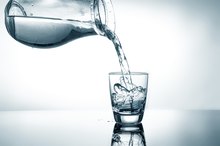What does fact checked mean?
At Healthfully, we strive to deliver objective content that is accurate and up-to-date. Our team periodically reviews articles in order to ensure content quality. The sources cited below consist of evidence from peer-reviewed journals, prominent medical organizations, academic associations, and government data.
The information contained on this site is for informational purposes only, and should not be used as a substitute for the advice of a professional health care provider. Please check with the appropriate physician regarding health questions and concerns. Although we strive to deliver accurate and up-to-date information, no guarantee to that effect is made.
Signs & Symptoms of Brain Dehydration
Brain dehydration is a serious condition—by the time the brain is feeling the effects of dehydration, the rest of your body is suffering. Dehydration occurs when you do not intake enough fluids, like water. This leads to an improper water volume in the body, resulting in an imbalance of the minerals in the bloodstream cells. The mineral imbalance interferes with the normal function of brain cells and, when left untreated, can result in permanent brain damage or death.
Brain Cell Function
Brain cells require the right amount of water and minerals in each of the cells 2. If there is too much water, the cell's membrane can break; if there is not enough, the cell will shrivel up. When there is brain dehydration, less water is available for brain cells to use. This decreases the efficiency of transport of minerals and other materials between cells, thus affecting their function. Ultimately, the brain dehydration changes the structure of the brain cells, leading to their deterioration 2.
Dehydration Symptoms
Dehydration & Potassium Levels
Learn More
Signs of dehydration are noticed before brain dehydration signs 1. If the symptoms of dehydration are noticed before the brain suffers from dehydration, you will not experience detrimental effects on the brain. Common dehydration symptoms include:
- a dry or sticky mouth
- little or no urine released
- no tears being produced
- eyes sunken in their sockets
- lethargy and
- in severe cases of dehydration
- coma
One physical sign of dehydration can indicate that dehydration is beginning to affect the brain: you will exhibit a soft spot on the top of your head, like an infant has. This condition is known as sunken fontanelles.
- Signs of dehydration are noticed before brain dehydration signs 1.
- Common dehydration symptoms include: * a dry or sticky mouth
* little or no urine released
* no tears being produced
* eyes sunken in their sockets
* lethargy and
* in severe cases of dehydration
* coma One physical sign of dehydration can indicate that dehydration is beginning to affect the brain: you will exhibit a soft spot on the top of your head, like an infant has.
Mental Effects
When dehydration affects the brain, mental ability will be affected immensely. Besides the symptom of physical lethargy, you will also have mental fatigue. As the brain dehydration continues, you will begin to have some memory problems and experience confusion.
Untreated
Why Is Water Important in a Balanced Diet?
Learn More
When left untreated, brain dehydration can have serious effects. Due to the deterioration of brain cells from lack of water, brain dehydration can lead to seizures and permanent brain damage, which can impair your physical and mental abilities. In addition, untreated dehydration can ultimately lead to death.
Tips
The daily recommended water intake is eight glasses of water. Keep a recyclable or reusable water bottle with you throughout the day to help prevent dehydration from occurring. Besides water, drinking fluids with electrolytes can help immensely if you are dealing with dehydration.
Related Articles
References
- Medline Plus Medical Encyclopedia: Dehydration
- The Praeger Handbook of Learning and the Brain; Sheryl Feinstein; 2006
- Shaheen NA, Alqahtani AA, Assiri H, Alkhodair R, Hussein MA. Public knowledge of dehydration and fluid intake practices: variation by participants' characteristics. BMC Public Health. 2018;18(1):1346. doi:10.1186/s12889-018-6252-5
- Shaheen NA, Alqahtani AA, Assiri H, Alkhodair R, Hussein MA. Public knowledge of dehydration and fluid intake practices: variation by participants' characteristics. BMC Public Health. 2018;18(1):1346. doi:10.1186/s12889-018-6252-5
- American College of Sports Medicine et al. American College of Sports Medicine position stand. Exercise and fluid replacement. Med Sci Sports Exerc. 2007 Feb;39(2):377-90.
- Nardone R, Brigo F, Trinka E. Acute Symptomatic Seizures Caused by Electrolyte Disturbances. J Clin Neurol. 2016;12(1):21-33. doi:10.3988/jcn.2016.12.1.21
- Popkin BM, D'Anci KE, Rosenberg IH. Water, hydration, and health. Nutr Rev. 2010;68(8):439–458. doi:10.1111/j.1753-4887.2010.00304.x
- Vega RM, Avva U. Pediatric Dehydration. [Updated 2019 Feb 3]. In: StatPearls. Treasure Island (FL): StatPearls Publishing; 2020 Jan-.
- Choi JW, Kwon SH, Huh CH, Park KC, Youn SW. The influences of skin visco-elasticity, hydration level and aging on the formation of wrinkles: a comprehensive and objective approach. Skin Res Technol. 2013;19(1):e349-55. doi:10.1111/j.1600-0846.2012.00650.x
- Popkin BM, D'Anci KE, Rosenberg IH. Water, hydration, and health. Nutr Rev. 2010;68(8):439–458. doi:10.1111/j.1753-4887.2010.00304.x
- Roussel R, Fezeu L, Bouby N, et al. Low water intake and risk for new-onset hyperglycemia. Diabetes Care. 2011;34(12):2551-4. doi:10.2337/dc11-0652
- Hooper L et al. Clinical symptoms, signs, and tests for identification of impending and current water-loss dehydration in older people. Cochrane Database Syst Rev. 2015 Apr 30;(4):CD009647. doi: 10.1002/14651858.CD009647.pub2
- Diggins KC. Treatment of mild to moderate dehydration in children with oral rehydration therapy. J Am Acad Nurse Pract. 2008 Aug;20(8):402-6. doi: 10.1111/j.1745-7599.2008.00338.x
- Strachan SR, Morris LF. Management of severe dehydration. J Intensive Care Soc. 2017;18(3):251-255. doi:10.1177/1751143717693859
- Copyright © 2020 National Academy of Sciences. All Rights Reserved. Dietary Reference Intakes for Electrolytes And Water. Published October 8, 2018.
- Polhuis KCMM, Wijnen AHC, Sierksma A, Calame W, Tieland M. The Diuretic Action of Weak and Strong Alcoholic Beverages in Elderly Men: A Randomized Diet-Controlled Crossover Trial. Nutrients. 2017;9(7):660. doi:10.3390/nu9070660
- Johns Hopkins Medicine. Dehydration and Heat Stroke.
- Snell PG, Ward R, Kandaswami C, Stohs SJ. Comparative effects of selected non-caffeinated rehydration sports drinks on short-term performance following moderate dehydration. J Int Soc Sports Nutr. 2010 Aug 22;7:28. doi: 10.1186/1550-2783-7-28
- Somers MJ. (2018). Clinical assessment and diagnosis of hypovolemia (dehydration) in children. Mattoo TK, Kim MS, eds. UpToDate. Waltham, MA: UpToDate Inc.
Writer Bio
Lia Stannard has been writing about women’s health since 2006. She has her Bachelor of Science in neuroscience and is pursuing a doctorate in clinical health psychology.








